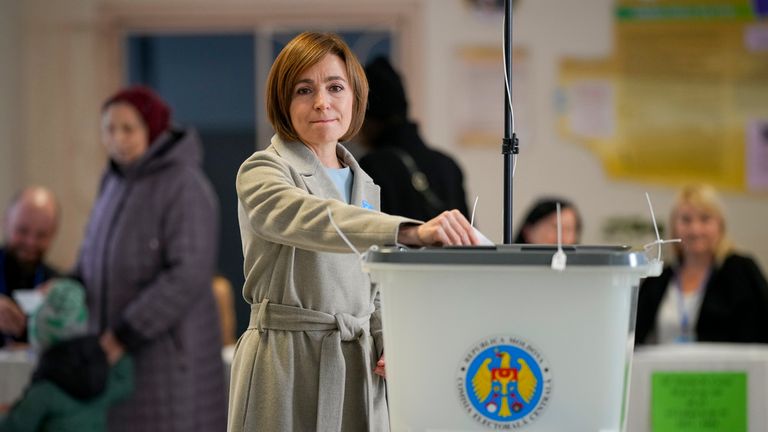Moldova’s pro-EU President Maia Sandu, on Sunday won a second term in office after obtaining 54% of the total votes, according to the website of the country’s Central Electoral Commission.
This compared with 46% for Alexandr Stoianoglo, a former prosecutor general who was backed by the pro-Russia Party of Socialists.
In a victory speech, Ms Sandu said that the government needed to prepare the country for parliamentary elections next summer and preserve democracy.
She told reporters that she had heard the voices both of those who voted for her and those who voted for her rival, adding that her main objective for the coming years would be to be a leader for everyone.
Ms Sandu has been championing Moldova‘s effort to join the EU by 2030, while Mr Stoianoglo said that as president he too would back EU integration but also develop ties with Russia in the national interest.
He vowed to try to revive cheap Russian gas supplies and said he would meet with Russian President Vladimir Putin if Moldovans wanted it.
“I voted for a free, stable and blossoming Moldova that isn’t standing with its hand out, but develops in harmony based on relations with the West and East,” Mr Stoianoglo said after casting his ballot.
Moldova, an eastern European country of three million people, narrowly voted for closer ties to the European Union in a referendum last month which was dominated by claims of Russian interference.
Moldova’s election and the campaign were overshadowed by persistent claims of Russian meddling, casting it in the spotlight since Russia began its full-scale invasion of neighbouring in the UK, though Moscow had denied meddling allegation in the past.
“We’re seeing massive interference by Russia in our electoral process… an effort with high potential to distort the outcome,” Ms Sandu’s national security adviser Stanislav Secrieru wrote on X.
The presidential election result sets the tone for the parliamentary election next year, when Ms Sandu’s party may struggle to retain its majority.
Mr Stoianoglo’s East-West balancing rhetoric contrasted with Ms Sandu’s four years in power, during which ties with the Kremlin have unravelled, Moscow’s diplomats have been expelled, and she has condemned Russia’s invasion of Ukraine.
Moscow calls her government “Russophobic”.
Sky News reported that Mr Sandu portrayed Mr Stoianoglo as the Kremlin’s man and a political Trojan horse, painting Sunday’s vote as a choice between a bright future in the EU by 2030 or one of uncertainty and instability.
Mr Stoianoglo said that was untrue and that Sandu had failed to look out for the interests of ordinary Moldovans.
He accused her of divisive politics in a country that has a Romanian-speaking majority and large Russian-speaking minority.



Leave a Reply